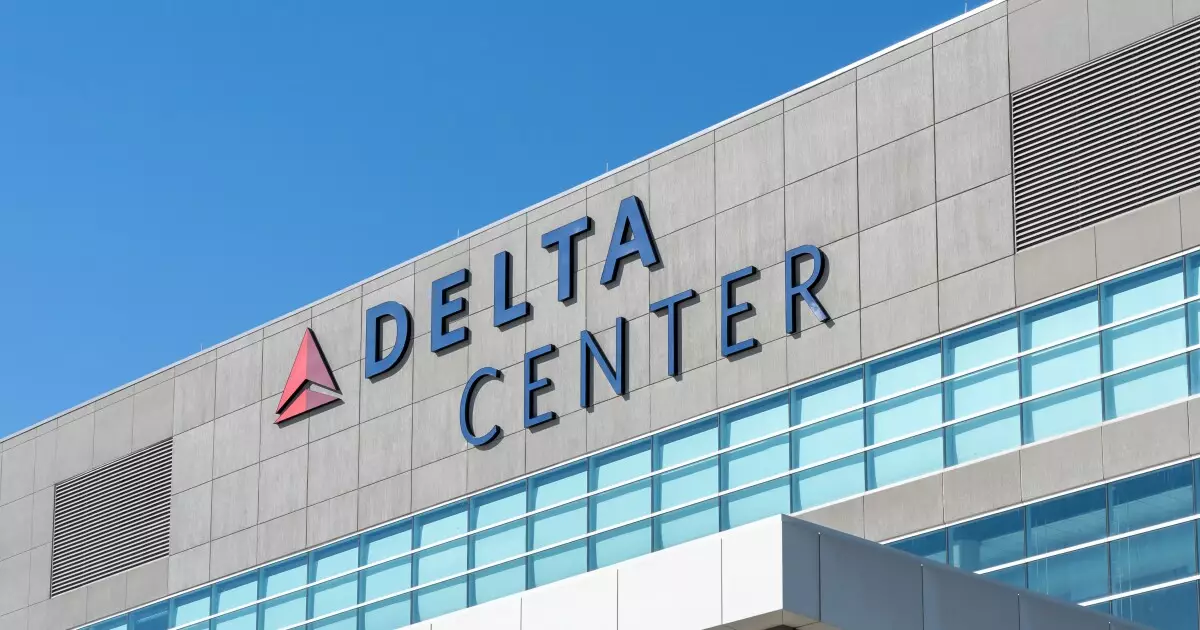Salt Lake City has embarked on an ambitious venture, with the announcement of a $900 million sales tax revenue bond issuance to finance the renovation of the Delta Center and other downtown infrastructure improvements. While such initiatives may appear to be catalysts for urban revitalization and economic growth, this massive undertaking demands scrutiny. With soaring costs and uncertain economic conditions, is Salt Lake City putting its fiscal future in jeopardy for the sake of glamour?
The Downtown Revitalization Public Infrastructure District’s decision to issue bonds for the Delta Center stems from a newly enacted 2024 law allowing the city to leverage its sales tax revenue. While it’s commendable for city officials to seek out investments that promise to boost local economies, one must question the appropriateness of financing a professional sports arena through debt. As the saying goes, sometimes things that glimmer turn out to be mere fool’s gold.
Taxation without Representation: The Sales Tax Hike Dilemma
A significant aspect of this bond issue is the accompanying 0.5% sales tax increase, currently levied on nearly all purchases, except for essential items like groceries and various vehicles. The expectation is that this tax hike will generate around $1.2 billion over three decades to repay the bonds. However, imposing this tax on the general public raises moral questions about accountability.
With an economic landscape that has only recently begun to recover from the impact of the pandemic, placing additional burdens on consumers could have dire consequences. Salt Lake City residents are now faced with the dual challenge of rising costs of living and the promise of long-term commitment to a sports complex that may not yield the anticipated revenue growth.
The increase has been approved by city council, yet a looming concern persists: will citizens feel the long-term financial implications of a venture that might or might not deliver on its projected growth?
Down the Rabbit Hole: Investment in Sports Franchises
The Salt Lake City infrastructure improvements are largely focused on the Delta Center, which has transitioned from a basketball-only venue to a dual-purpose arena that hosts both NBA and NHL games. But one must ponder the wisdom of tying the city’s financial fate to the whims of professional sports franchises.
When the deal was struck, it was hoped that the introduction of hockey would ensure a full house year-round. Yet recent historical data highlights the precarious nature of sports franchises—teams can leave, while fan loyalty may wane as trends change. If either the Utah Jazz or the Utah Mammoth decide to leave Salt Lake City, the city risks finding itself with a financially burdensome arena with far fewer ticket-buying patrons.
Risk Management: Credit Ratings and Downside Scenarios
The calculation of risk versus reward is crucial in municipal finance, and the city’s credit ratings have become a topic of interest. According to Moody’s Ratings, the first lien bonds are rated A1 largely because of the anticipated robust revenue streams. Yet, the stability of this rating hinges precariously on the economic health of Salt Lake City itself.
As noted by analysts, any downgrades or declines in coverage ratios could spell trouble ahead. It feels like a precarious house of cards: one faltering component could send the entire scheme tumbling down. While the anticipated revenue streams appear stable in theory, the reality of financial markets is far less forgiving during downturns.
In learning from past mismanagement issues in municipal bond financing, which have plagued other cities, Salt Lake City would be wise to proceed with caution. After all, taxpayers should not bear the brunt of poor financial decisions made on their behalf.
Time Frames and Uncertain Returns
The projected timeline for the Delta Center renovations anticipates completion by fall 2027, with an Olympic event looming on the horizon in 2034. While immediate investment may appear peachy with the upcoming Winter Olympics, the long-term implications of such an investment loom large. The aging infrastructure of the arena begs the question: is this renovation truly sufficient to modernize the venue and deliver lasting returns?
For many municipal leaders, the question becomes one of urgency. They feel pushed to act quickly to secure investment before potential benefits slip out of reach. Consequently, this rush creates a recipe for hasty decision-making, often leading to oversights in the planning stages.
Debt and Infrastructure: A Recipe for Economic Stagnation?
Consumer debt remains alarmingly high across the nation. By plunging further into debt to fund sports arenas and entertainment districts rather than infrastructure improvements, are Salt Lake City leaders jeopardizing the financial health of their constituents? Citizens typically want a city that prioritizes fundamental services over lavish spending on entertainment.
Investments in infrastructure should focus on public utility, accessibility, and educational enhancements, which tend to yield higher dividends to society. However, Salt Lake City’s commitment to tying its financial future to the entertainment sector raises concerning questions about misplaced priorities.
Next time Salt Lake City’s leaders sit down to discuss revitalizing the downtown core, perhaps they should consider whether they’re allowing sports franchises to dictate fiscal policy rather than reprioritize the needs of their residents. With great ambition comes great responsibility; Salt Lake City must ensure that it doesn’t let the glitter of professional sports blind it to the realities of fiscal prudence.

